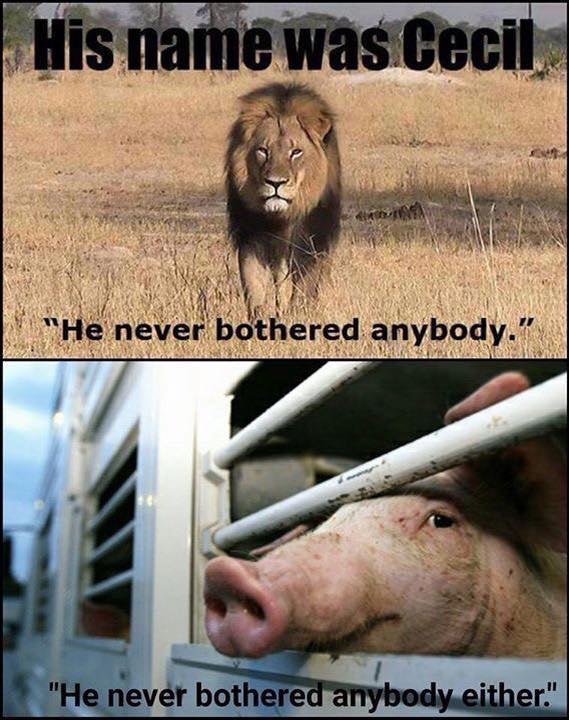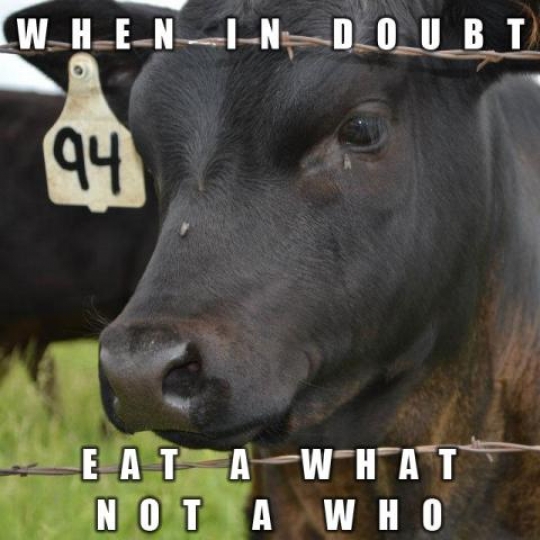By now, the story of Cecil the lion is old news. For about a week I couldn't go anywhere without seeing or hearing about his story. In case you're not familiar, Cecil was a lion living in Zimbabwe who was killed by a trio of hunters led by an American dentist. He apparently spent $50,000 to pay for the privilege. The killing was illegal, as Cecil was a protected lion living on protected land and was lured away from that land with food. After being shot, Cecil lived for another two days before he succumbed to his injury.
While a lot of my friends were quite upset, even calling for the dentist's execution (in many countries, poachers are shot on sight, after all) a few were annoyed that the story was getting so much attention. They said it wasn't important news and was distracting from real things going on in the world. In a way I (at first) agreed, but not for the same reason. You can say my first reaction was cynical.
Recently I had gone to a restaurant and discovered it was full of deer heads. So many heads that no matter which way I faced, I was looking at one. Basically, vegan Hell. Except that for some reason they had a veggie burger on the menu. And with all those animals who were beheaded just like Cecil, there were no protestors outside. No one painted messages on the door.
Another time I went to see a concert at a road house bar. They had one of those claw grab machines, only instead of stuffed toy animals it was full of live lobsters. If you managed to grab one they'd cook him or her alive for you. This did not make it into the paper or cause an internet furor.
An in-law of mine hunts, and his business isn't boycotted as far as I know. So Cecil's story did seem to me like a drop in the bucket compared to all the animals killed every day. My first, cynical, reaction was to call it cutitarianism. We get upset when animals we like get killed - majestic lions, adorable fluffy bunnies, or giraffes in zoos.
Not too long ago there was another minor uproar when a zoo killed excess giraffes and fed them to lions. People were horrified that a zoo, which seems to exist to conserve animal lives (in reality zoos exist to make a profit), would kill the animals in their charge. People were probably horrified to see lions engaging in lion behavior, eating chunks of giraffe. But if people had witnessed the lions eating nondescript giraffe steak rather than obvious giraffe parts, they wouldn't have noticed anything amiss. If the zoo had fed cow meat to the lions no one would care. Exoticisization is a close cousin to cutitarianism, in which we value the exotic, rare, or special more than the familiar.
There are a lot of cultural taboos where certain animals are food and others are friends. In America most people don't support eating dogs or horses because we have a special relationship with them. In other places it's perfectly normal. We also don't commonly eat frogs or insects, not out of a special relationship but because it's kind of gross. But we do often eat aquatic arthropods - shrimp, lobsters, crabs - which are really similar to insects. Lions are off the menu to most Americans. When we lionize someone, we give them a lot of public approval and treat them as a celebrity. They're an animal that many of us have a special respect for.
These are the things that went through my head initially. I thought that if lions weren't endangered, if instead we bred them in extraordinary numbers, that people would care less. Now I promise, while I'm not demure about valuing non-human lives, I do try not to be inflammatory. But I nonetheless posted this provocative picture on Facebook:

My caption read, "In both cases it's done for personal pleasure." Because I knew that the crux of the matter, for a lot of people, was that it's necessary to kill some animals for food, but a barbaric waste of life to kill for the thrill. One is survival, the other murder. That's why I was trying to point out that it's not necessary at all, but instead a lifelong habit that we do for enjoyment and tradition. The conversation didn't really go in that direction, but I got a better appreciation for the way some meat eating friends see things.
Instead, now, I'm hopeful. Cecil's story gives me hope. It shows me that so many of us really do value animals as individuals that deserve to live. But it's hard because we're trained to ignore or denounce those feelings. We're trained that compassion is adorable in children but weakness in adults. When so many of us, as children, are horrified to discover where meat comes from, we're trained to Stoically accept what's necessary. Acceptance eventually turns to indifference and we stop thinking about it.
But in these singular instances, we do think about it. We might ignore the faceless masses of cows, chickens, and others that die for us every year, but we do care for singular individuals. There have been a few stories of animals escaping slaughter - most recently a pig who escaped and went to a Buddhist temple, where he appeared to pray. When he was eventually slaughtered people were outraged because he was special and deserved to live.
In the height of the mad cow scare millions of cows were slaughtered to prevent it from spreading. In a cull of thousands, a lone calf escaped the pile of bodies and people literally cheered for him. It was an emotional moment to see one brave child triumph over death.
Colleen Patrick-Goudreau wrote a great short piece about Cecil addressing this phenomenon. It's her opinion that we value Cecil because he had a name, an identity.
People raised on animal farms or ranches know this all too well. Many are taught not to get close to the animals they breed to kill or sell for slaughter, and they’re discouraged from naming them, because once you name an individual, you acknowledge he has his own personality, likes and dislikes, relationships and quirks. It’s a lot easier to kill someone you don’t know.
I was tempted to repost her article here instead of writing my own.
What she's describing is a really human quality. We're relational creatures. And somehow that gives me hope - that we have a doorway into empathy, a doorway into valuing others for their own sake instead of what we might want from them. I've posted before that I think inspiration, and not just reason alone, is key to awakening hearts and minds. This just solidified that for me. Not everyone is going to be convinced by statistics, but story is something that touches so many of us deeply. Cecil's name and story reached people, and it means that others' stories can too. If his death can help awaken us to a sense of compassion or justice, and if that inspires us to spare or even save other lives, that's a beautiful legacy.




Leave a comment!